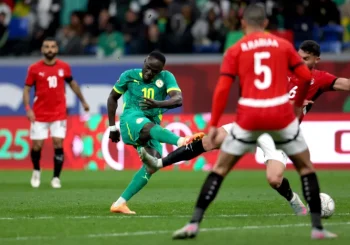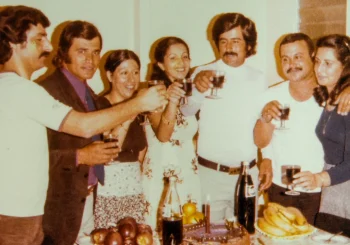Head of the Catholic Church sporting a white Balenciaga puffer coat; Donald Trump being arrested by police forces; Drake covering Wegz’s hit song El Bakht: none of these scenes or songs are true, but artificial intelligence (AI) has loosely blurred the line between fiction and reality.
Egypt’s Sot w Soura (Sound and Picture) has ignited profound conversations on the on the daunting effects of social media, artificial intelligence, and their influence on public perception.
Directed by Mohammed Abdel Tawab and written by Mohammed Suleiman Abdul-Mali, this 30-episode series navigates the realms of societal issues, trauma, corruption, while narrating a gripping murder mystery.
The series features a star-studded cast, including Hanan Motawie, Sedky Sakhr, Naglaa Badr, Nadine Farrag, Fadwa Abed, Walid Fawaz, Mourad Makram, and Amr Wahba.
In my opinion, Sot w Soura is one of the important shows that have emerged in recent years. Aside from addressing important issues, the show is incredibly realistic — showcasing how, more often than not, the ‘bad’ guys can win, and drones into the potentially dangerous and harmful impact of social media and AI.
Note: Stop reading here if you want to avoid spoilers. The below discusses key plot points of the series.
The Story: The Blurred Line Between Truth and Deception
Radwa’s journey, (played by Hanan Motawie), resonates profoundly as she grapples with the trauma of sexual assault and fights for justice. Radwa is a stay-at-home mother, but when her husband, Abdel-Ghany (played by Walid Fawaz), needs urgent money for medical reasons, Radwa hunts for a job. To her luck — and later dismay — she finds a job working at Dr. Essam El-Sayad’s (played Mourad Makram) clinic.
El-Sayad’s initial behavior was peculiar. In his interview with Radwa — as well as every other woman — he makes them talk to a camera. Despite this oddity, Radwa pays no attention to it, because she is happy to have secured a job that will pay her a decent salary for the time being.
Then, the unexpected unfolds; one night, as Radwa is working late, the doctor invites her to his office, closes the door, and sexually assaults her. In a powerful fight against power, money, and society, Radwa endeavors to seek justice and fights back legally.
Despite being shunned by society, her family members, as well as her husband — who leaves her — Radwa accuses the renowned doctor of rape and sexual harassment. He vehemently denies all accusations, aided by a corrupt lawyer called Magda (played by Nadine Farrag), who frames Radwa as a money-driven opportunist and the doctor a virtuous family man.
In the midst of the case, and her grief, Radwa finds herself entangled in another case, the murder of Dr. Essam El-Sayad. She then seeks help from Lotfy Aboud (played by Sedky Sakhr) a humble lawyer who hasn’t been practicing for a long time. He takes Radwa’s case pro-bono and defends her in trial.
Radwa’s trial proves one of the show’s most riveting and disrupting scenes.
Despite evidence indicating her presence at the clinic during the murder and a potential motive to kill due to her past accusations, her lawyer presents a robust defense. He hinges his argument on the manipulability of footage in the age of social media and AI, presenting footage of him entering and exiting the clinic, thus challenging the credibility of the evidence against Radwa.
Throughout the series, we encounter various murder suspects, including El-Sayad’s wife Nermine (played by Naglaa Badr), his son Hazem (played by Youssef Wahby), and many others.
The story also uncovers trauma’s manifestation, seen in how Radwa refrains from explicitly denying killing the doctor, attributing her uncertainty to memory lapses.
The show also deals with the pervasive influence of money, bribery, and how corruption is everywhere. Magda is the perfect example of an amoral lawyer, who bends the laws to her favor, and uses her power to her advantage.
An interesting aspect about Magda was how — as a woman — she was defending a sexual harasser. Despite all the evidence and testimonies of other women that attest to the doctor’s sexual harassment, she does not believe the victims. Rather, she is blinded by her power as a lawyer and uses illegal methods to attain her goals.
The climactic revelation in the series finale unveils that El-Sayad’s accidental murderer was Lofty’s brother, Walid (played by Ahmed Maged), who manipulated events to absolve himself as a suspect.
The Watching Experiences: Bring Back 15-episode Shows
The viewing experience not for the faint-hearted, delving into the disquieting realities shaped by AI and social media. It isn’t a text-book scary show, but the issues depicted in it shed light on the terrifying reality we live in today. Ever since the development of AI, seeing has not been believin — images are fabricated, voices are faked, and evidence is manipulated.
Hanan Motawie delivered a heart-wrenching role in this series — masterfully depicting grief, powerlessness, desperation, and resilience, and a relentless fight against adversity. Similarly, Naglaa Badr’s depiction of El-Sayad’s wife navigating her family’s shattered world adds depth to the narrative.
The show offers moments of levity through; Wafy (played by Amr Wahba) who plays the lawyer’s assistant delivered incredibly funny and witty one-liners that served as comedic reliefs during the show. It was a reminder that even when everything seems dark, there is always room to breathe.
In my opinion, I believe this show could have been just 15 episodes, without the unnecessary subplots and storylines. I do admit that I was on my toes the entire 30 episodes, wondering if Radwa was the one who ended up killing him or not. I had my eye on several suspects, so when the last episode revealed that Wald was the killer, it was incredibly underwhelming.
Overall, Sot w Soura is definitely one of the best Egyptian shows produced during recent years. It is riveting, daunting, and harrowing, yet it is equally important. It shows the importance of film and TV in highlighting imperative issues in the world.







Comments (0)